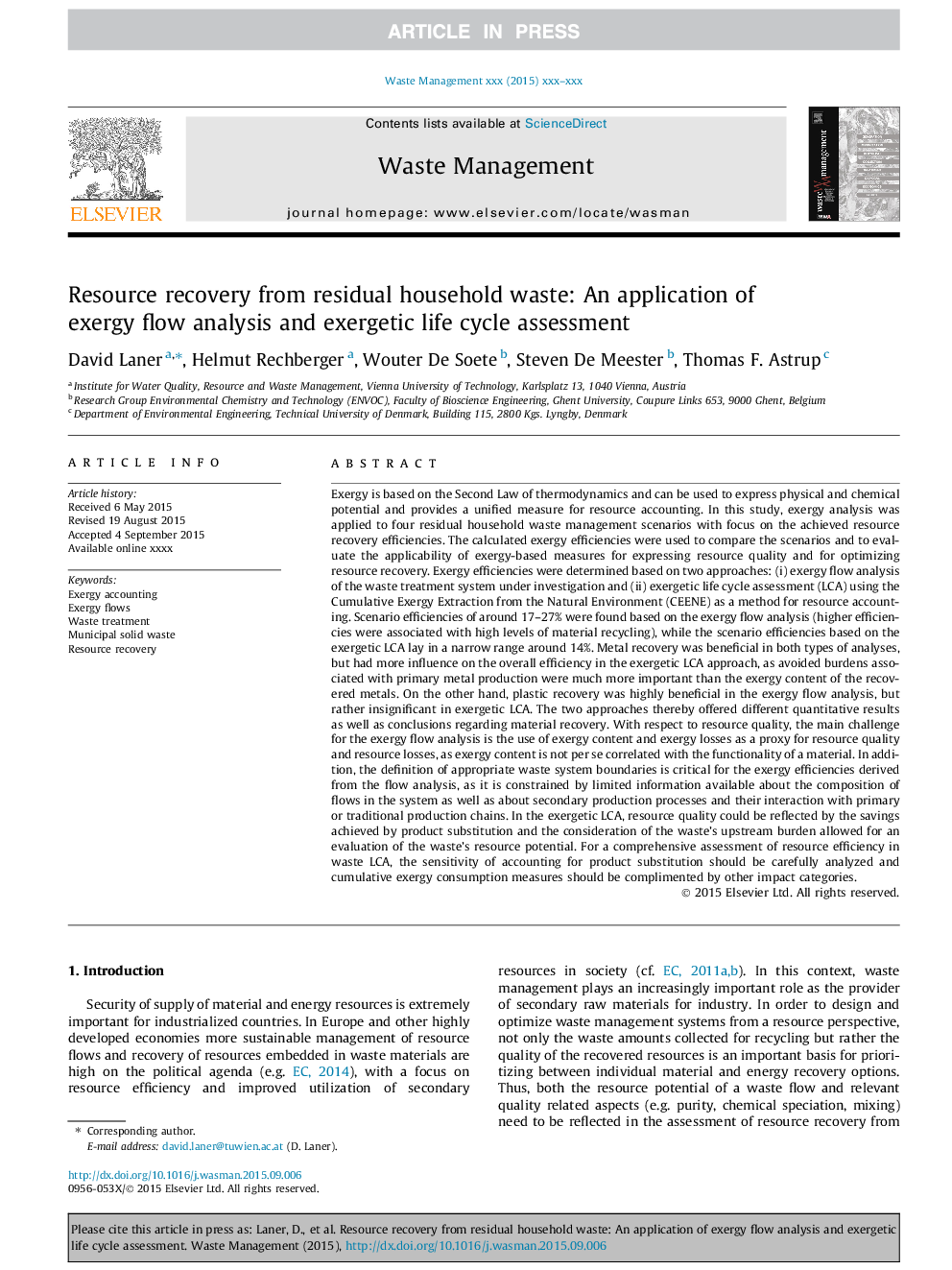| کد مقاله | کد نشریه | سال انتشار | مقاله انگلیسی | نسخه تمام متن |
|---|---|---|---|---|
| 6354580 | 1622639 | 2015 | 15 صفحه PDF | دانلود رایگان |
عنوان انگلیسی مقاله ISI
Resource recovery from residual household waste: An application of exergy flow analysis and exergetic life cycle assessment
ترجمه فارسی عنوان
بازیافت منابع از ضایعات خانگی دیگر: استفاده از تجزیه و تحلیل جریان اگزرژی و ارزیابی چرخه عمر اضافی
دانلود مقاله + سفارش ترجمه
دانلود مقاله ISI انگلیسی
رایگان برای ایرانیان
کلمات کلیدی
حسابداری اگزرژی، جریان اگزرژی، درمان ضایعات، زباله جامد شهری، بازیابی اطلاعات،
موضوعات مرتبط
مهندسی و علوم پایه
علوم زمین و سیارات
مهندسی ژئوتکنیک و زمین شناسی مهندسی
چکیده انگلیسی
Exergy is based on the Second Law of thermodynamics and can be used to express physical and chemical potential and provides a unified measure for resource accounting. In this study, exergy analysis was applied to four residual household waste management scenarios with focus on the achieved resource recovery efficiencies. The calculated exergy efficiencies were used to compare the scenarios and to evaluate the applicability of exergy-based measures for expressing resource quality and for optimizing resource recovery. Exergy efficiencies were determined based on two approaches: (i) exergy flow analysis of the waste treatment system under investigation and (ii) exergetic life cycle assessment (LCA) using the Cumulative Exergy Extraction from the Natural Environment (CEENE) as a method for resource accounting. Scenario efficiencies of around 17-27% were found based on the exergy flow analysis (higher efficiencies were associated with high levels of material recycling), while the scenario efficiencies based on the exergetic LCA lay in a narrow range around 14%. Metal recovery was beneficial in both types of analyses, but had more influence on the overall efficiency in the exergetic LCA approach, as avoided burdens associated with primary metal production were much more important than the exergy content of the recovered metals. On the other hand, plastic recovery was highly beneficial in the exergy flow analysis, but rather insignificant in exergetic LCA. The two approaches thereby offered different quantitative results as well as conclusions regarding material recovery. With respect to resource quality, the main challenge for the exergy flow analysis is the use of exergy content and exergy losses as a proxy for resource quality and resource losses, as exergy content is not per se correlated with the functionality of a material. In addition, the definition of appropriate waste system boundaries is critical for the exergy efficiencies derived from the flow analysis, as it is constrained by limited information available about the composition of flows in the system as well as about secondary production processes and their interaction with primary or traditional production chains. In the exergetic LCA, resource quality could be reflected by the savings achieved by product substitution and the consideration of the waste's upstream burden allowed for an evaluation of the waste's resource potential. For a comprehensive assessment of resource efficiency in waste LCA, the sensitivity of accounting for product substitution should be carefully analyzed and cumulative exergy consumption measures should be complimented by other impact categories.
ناشر
Database: Elsevier - ScienceDirect (ساینس دایرکت)
Journal: Waste Management - Volume 46, December 2015, Pages 653-667
Journal: Waste Management - Volume 46, December 2015, Pages 653-667
نویسندگان
David Laner, Helmut Rechberger, Wouter De Soete, Steven De Meester, Thomas F. Astrup,
